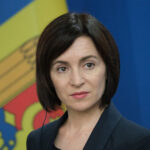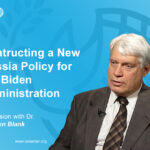On April 22, Russian Minister of Defense Sergei Shoigu announced from the occupied Crimean Peninsula the conclusion of Russia’s snap drills. Troops deployed along the Ukrainian border and in occupied Crimea will begin returning to their bases starting on April 23, finishing on May 1.
These drills led to the deployment of 110,000 Russian troops along the northern and eastern Ukrainian border as well as in occupied Crimea. These deployments, accompanied by a massive increase in ceasefire violations by the Russian-backed Donbas rebels, and compounded by traditional Kremlin opacity, led to widespread fears of an imminent Russian invasion of Ukraine.
In response, the United States European Command raised its threat level for Ukraine from ‘Possible Crisis’ to ‘Potential Imminent Crisis’ – its highest level. U.S. President Joseph Biden, Secretary of State Antony Blinken, and National Security Advisor Jake Sullivan all made calls to their Ukrainian counterparts early in the crisis, declaring their ‘unwavering support’ for Ukraine. Calls followed from United Kingdom (UK), European Union (EU), and NATO leaders declaring support for Ukraine.
Relations between Russia and the West have fallen to a new nadir over this conflict. President Biden issued a new set of financial sanctions targeting Russia’s state debt, citing Russian human rights violations, its malign interference in Western democracies’ elections, the SolarWinds hack, and aggression against Ukraine (among others) as the reasons for the new sanctions.
Diplomatic expulsions have also marked this new period of antipathy. The United States and Russia have each expelled diplomats, with Russia also forbidding the U.S. (and Czech) embassies from employing Russian citizens. Russia ordered the expulsion of Alexander Sosoniuk, Ukraine’s Consul-General of the Ukrainian Consulate in St. Petersburg on April 17, after briefly detaining him on charges of espionage the day prior.
The Czech Republic has been involved in a tit-for-tat expulsion of diplomats with Russia following scandalous revelations that the GRU (Russia’s military intelligence organization) was responsible for the lethal explosion of a Czech munitions dump in 2014. With Czech officials calling the incident an act of state terror, Prague and Moscow have ordered the expulsion of diplomats. The EU and NATO have both given their support to the Czechs amidst this diplomatic imbroglio. Czech Foreign and Interior Minister Jan Hamacek has also called on EU and NATO countries to join Prague in expelling Russian diplomats in response to the attack.
The potency of the Western response has faltered because the two strongest European powers, France and Germany, have shown disinterest. Both France and Germany prefer to let the EU take the lead on standing against Russia. But the Kremlin has revealed disdain for Brussels with its snub of EU High Representative Josep Borrell in February. Berlin and Paris will need to take an active stance towards Russia if the Kremlin is to believe the West is serious about protecting its interests.
Minister Shoigu said that the snap drills had accomplished their purpose. One result was President Biden offering a one-on-one summit with President Putin. The summit proposal, rejected by Putin, was hailed as a political victory against the West in the Russian media. The new financial sanctions against Russia have also been shrugged off by a Russian economy reconfigured for stagnant autarky, with Russia selling bonds of state debt to domestic banks.
For the Kremlin, this test of Western resolve has revealed exploitable cracks in Paris and Berlin. A misunderstanding of Western resolve, like that which happened after the 1961 Berlin Crisis and led to the 1962 Cuban Missile Crisis, is more than possible. It is imperative that the West disillusion Russia of this notion to avoid a similar repeat of history.
Steps towards this goal have already been taken. The U.S. Senate unanimously passed the Ukraine Security Partnership Act (USPA) on April 22. This act commits $300 million per year to the development of the Ukrainian military. Importantly, the USPA also states Ukraine was occupied throughout the entire Soviet period. The United States should also focus on developing Ukraine’s anti-drone capabilities, as well as the lethality of the Ukrainian Air Force and Navy. Additionally, the United States and its allies should declare all goods coming from Crimean ports as contraband.
While the United States updates Ukraine’s military, the UK should reposition itself. With its goals of establishing a ‘Global Britain,’ London should build on its military cooperation with Ukraine by focusing the Royal Navy in the Baltic, Black, and Mediterranean Sea regions to pressure Moscow, rather than pester [JL1] Beijing in the Indo-Pacific. Paris and Berlin should also show solidarity with Prague and expel Russian diplomats.
The 2021 Donbas Crisis is heading towards a resolution without a clear winner. With relations at a new low, Russia and the West risk sleepwalking to an even worse confrontation. Such a crisis is avoidable, but only if the Kremlin understands they cannot blackmail the West.

